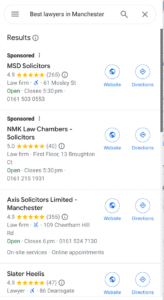Everyone’s heard the saying, there’s no such thing as bad press, but is it true? We guess the argument is that even if people are saying negative things about your business, they’re still talking about your business. However, let’s be honest, no one likes negative reviews, especially your local SEO strategy.
However, negative reviews might not be all that bad, and here’s why.
How negative reviews affect SEO and your online reputation

Google states that positive and high-quality reviews are a great way to improve your local rankings. So, if you see a negative review pop up for your business, you may spring into panic mode. Search engines do look at what your customers are saying and they’re less likely to recommend you if there’s a lack of satisfaction or response from you.
But it doesn’t always mean bad news! How you act depends on whether it will impact local SEO efforts, and they can have some indirect positive effects.
Another classic saying of ‘nobody is perfect’ is exactly why negative reviews can help your business.
-
Balance authenticity
If you’re an online user who comes across a business that only has many 5-star reviews with little descriptions, it’s fair to assume that something might be a bit fishy. A careful balance of a few negative reviews can help stop that doubt of authenticity and when managed appropriately can provide benefits and improve your reputation.
-
Help improve and learn from your mistakes
With the thought that no one is perfect, receiving negative feedback can teach you and your business about what you need to improve on. Sometimes businesses think that what they’re doing is right, however some individuals might disagree. By gaining this feedback and responding in the correct way you can learn about any changes you should be making to further develop your business and please your customers.
-
Engage with your customers, especially if they aren’t happy
How you respond to negative reviews can be crucial and essentially matters more than the review itself. We’ve all seen in the past those negative reviews which have then led to brands fighting back in an argumentative tone and trying to discredit the reviewer. Instead, a better response is that of asking for more information, discussing why they feel like this and if possible offering some form of compensation or outcome to rectify the situation and make the customer happy. If you’re quick to respond and identify the problem, the negative review shouldn’t tarnish your reputation as a business.
Other users seeing how you respond will see that you’re a brand that cares about its service, reputation, and customers, helping to build trust and confidence that potential problems they have will be listened to.
Now we know that negative fake reviews can happen, and if you think this has happened to you, then we recommend reporting this to Google, and in the meantime responding to get more information rather than just ignoring it altogether. A response such as the following can help:
‘Thank you for your review and we’re sorry you’re feeling this way. We are struggling to find details of your ‘order/booking etc.’ and therefore ask if you are able to provide us with more information such as your order/booking number so that we can look into this further.’
If the review is genuine, the reviewer will be able to provide the details you ask for. However, if it’s fake, it’s likely they won’t respond, but other viewers can see that you have tried.
Power your online visibility with positive reviews

So whilst negative reviews, might not be the end of the world. Obviously, the more honest and positive reviews your business receives the better. Why?
Well, firstly reviews are user-generated content that other online users and Google like and trust. Reviews are also part of your Google My Business profile and can be shown in your local listings. Therefore if a user is searching for your products and services and you and a competitor are shown in the results, but the competitor has a higher rating and more positive reviews, the more likely the user is to choose the competitor over you.
It’s also important to note that if users include words such as ‘best’ or ‘top’ in their local searches then Google automatically defaults results to those brands who have a minimum of a four-star rating.
So what are the best reviews to boost your online visibility?
Additional commentary
As well as a high star rating, you want your reviewer to leave a comment that explains why they gave you that rating. This then gives Google and other users more helpful content to decide whether your business is more credible and aligned with what they’re looking for.
Meaningful media
Reviews with images and videos can amplify their impact, as again they add more authenticity and credibility. It has also been noted that these reviews tend to be shown higher up than those without. So, your business can get more visibility and viewers can see first-hand what you have to offer before committing to a purchase.
Recent and accurate information
You should ideally keep getting reviews as time goes on, as people tend to ignore or disregard older reviews- who knows, you could have changed since then! And customers might not take that risk. So, recent reviews have the most accurate information and level of trust. If your reviews are slipping and you haven’t received one in a while, then try our suggestions below!
Needing reviews with accurate information is self-explanatory- you don’t want any misinformation circulating the web regarding your business, so this also links to why reviews should be recent. If a user sees conflicting information from one review to the next, trust will inevitably waver.
How to improve your reviews, and therefore your SEO
It’s important to gain new reviews and therefore businesses should have a process in place to do so. There are several ways businesses can get more reviews, but one of them is definitely not to incentivise clients. This is what Google would deem ‘deceptive content’ especially if the customer leaves reviews in exchange for discounts, free goods, or even money. You can read more about this in Google’s guidelines on prohibited and restricted content.
So what can you do?

Ask for reviews
It might seem simple, but have you just asked? Quite often companies will be given positive feedback in person or over emails, and be happy with that. However, if you responded to this feedback with a simple ‘Thank you, would you mind leaving that as a review on Google’, I think you’d be surprised by how many would do this. Give clear, easy steps for how to leave a review so people are more likely to give it a go.
Motivate team members
Rather than asking for reviews being one person’s job, instead, motivate your whole team to be responsible for gaining reviews. Ask your team to try asking customers in person or reaching out to them online. One person can’t do this on their own, and it takes a group effort to accumulate as many reviews as possible from authentic customers.
Share your review link
Make it easy for people to leave you a review, by sharing direct links. For example, if you sell products then after your customers have received their purchases email them with a link to leave a review. If you are a service-based business you could do the same once your services are finished. Or send regular review links to your clients throughout your partnerships, perhaps after quarterly review meetings.
In summary, reviews can impact your local SEO, therefore they should be a part of your digital marketing strategy. Ultimately, you can’t stop negative reviews from happening, but what you can control is how you deal with them and hopefully, this guide will help you.
FAQs
What are other review sites apart from Google My Business?
Yes, many. Trustpilot, Fifo, reviews.io…. Trustpilot is up there with the most trusted however it is also one of the most expensive. To have all the benefits of a fully functioning business presence on Trustpilot, they offer different paid packages to better manage your reviews. Don’t put your business at risk by paying for all these different platforms, just as long as you have at least one place for people to leave and read reviews.
How many search users look at and use reviews to inform their decision-making?
More than you probably think! A 2024 survey has revealed the percentage of total online search users who ‘frequently’ look at online reviews, has risen to 98%. Customers are 1.5x more likely to be motivated by an online review than a discount offer.
Do negative reviews affect my Domain Authority?
Not declared by Google, it is thought that negative reviews will indirectly affect your Domain authority. Your brands’ online presence, whether that be on social media or reviews, all have a knock-on impact on your website’s ranking in the SERPS.
Can I remove bad reviews from my GMB profile?
You cannot remove bad reviews if they are from genuinely unhappy customers. Reply to these types of reviews and keep them polite. For false negative reviews, you can put in a complaint with Google to get these removed. Again, reply to these customers and openly disclose that there is no record of them being a customer of your business.












